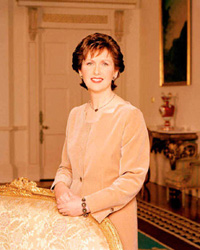CSPE Links
 Timor
Timor
 Cuba
Cuba
 Global Warming
Global Warming Africa I
Africa I  Argentina
Argentina  The Courts
The Courts  US Presidency
US Presidency  ASTI Strike
ASTI Strike  Attack
on America
Attack
on America
The President is the head of state and the guardian of the people's rights. The President must make sure that all new laws passed in the Dail do not conflict with the Constitution.
The people of Ireland voted for Bunreacht na hEireann in 1937. The only way the Constitution can be changed (amended) is by a majority of the people voting for an amendment in a referendum. To date 20 amendments have gone before the people in a referendum. Some were passed and others rejected.
Anytime the Government wishes to bring in a new law, it must be referred to the President. The President is the head of state and the guardian of the people's rights. The President must make sure that all new laws passed in the Dail do not conflict with the Constitution. To help the President make decisions about the constitutionality of new laws he/she can consult with the Council of State. These are a group of very experienced people many of whom are ex-Taoisigh.
 If the President and the Council of State are unsure that the new Bill is in accordance with the Constitution they may refer it to the Supreme Court who will make the decision.
If the President and the Council of State are unsure that the new Bill is in accordance with the Constitution they may refer it to the Supreme Court who will make the decision.Any citizen in the State can also go to the courts if they feel that a decision carried out by Government conflicts with the Constitution. Denis Riordan is an ordinary citizen from Limerick who has gone to the courts on many occasions because he felt the Constitution was being violated.
The President of Ireland is Mary McAleese(pictured above). The President is elected by the Irish people for a seven-year term. The President can only serve two terms. The last two Presidents have been women. Mary Robinson, who is now the UN High Commissioner for Human Rights, was elected the first woman President of Ireland in 1990.
The Constitution is divided up into a number of articles. The first 39 articles describe how the state is to be run. It includes rules on how a government is to be set up, how the courts should operate and so on.
Articles 40 to 45 set out the rights of citizens.
Article 40: Personal Rights
The citizens are guaranteed freedom and equal treatment under the law. They can express an opinion, hold a public meeting and form a political party.
Article 41: The Family
The state will protect the family as a fundamental unit of society.
Article 42: Education
Every citizen has the right to a free primary education. Recently, a woman received compensation from the courts because the state did not provide adequate education for her autistic son.
Article 43: Private Property
Citizens have the right to own and inherit property.
Article 44: Religion
The state guarantees equal treatment of the schools of different religions.
Article 45: Social Policy
The state will strive to promote the welfare of all people. All these articles are set out in Bunreacht na hEireann which is the Irish Constitution.


Courts

President

Hugh O'Flaherty